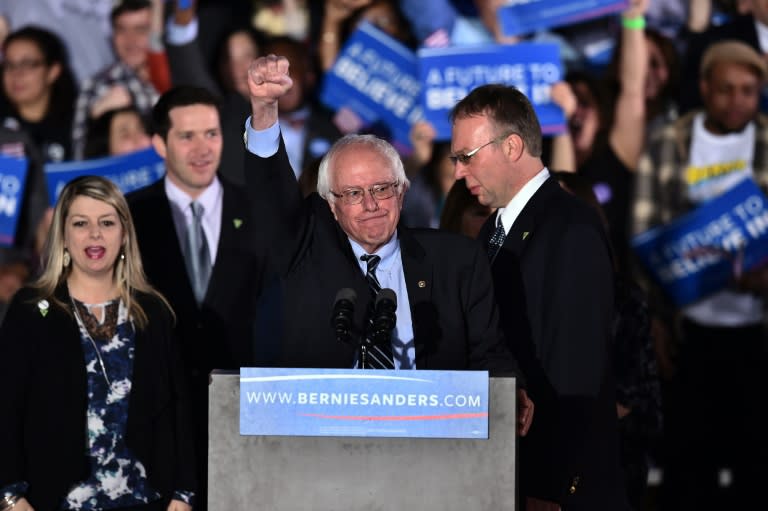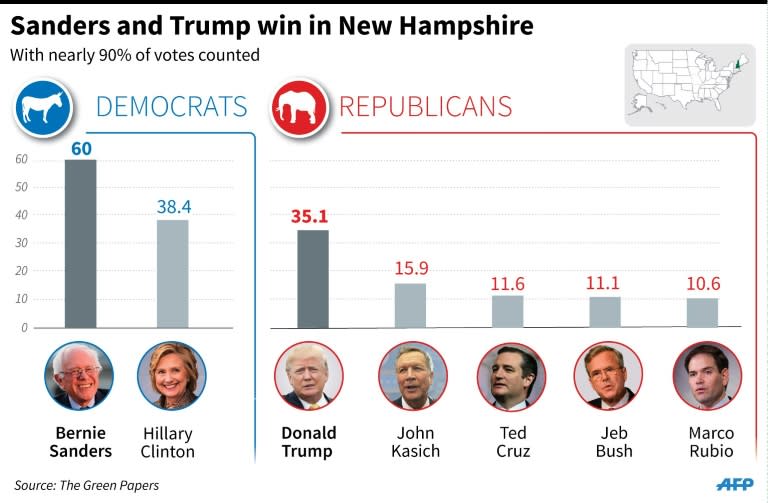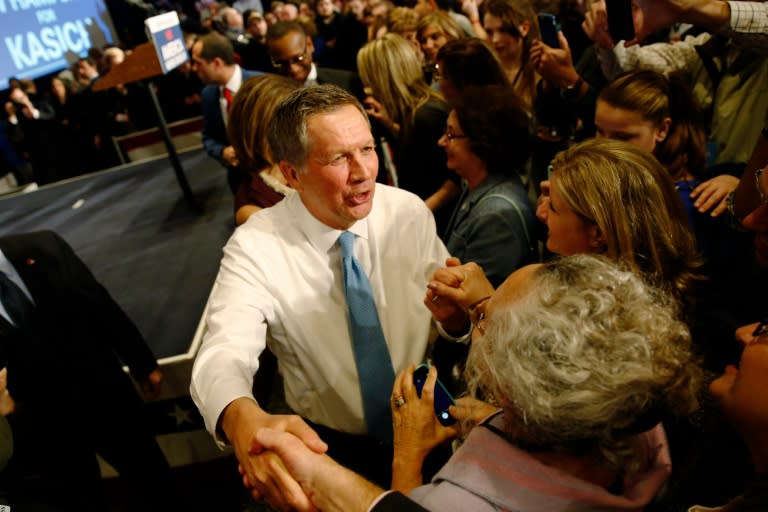Clinton, Republicans regroup after New Hampshire drubbing
Hillary Clinton and a gaggle of mainstream Republican presidential hopefuls turned their gaze southward Wednesday, hoping to move on from thumping New Hampshire primary defeats at the hands of Bernie Sanders and Donald Trump. Sanders and Trump -- two political outsiders with vastly different ideologies, but who have a common campaign credo of shouting truth at power -- resoundingly won the second contest in this months-long nomination race with some ease. Sanders almost doubled Clinton's tally and Trump bested second place Ohio Governor John Kasich by almost 20 percentage points. Both results shocked the party establishments, virtually guaranteeing bitter and drawn-out races to the Democratic and Republican nominations. And New Hampshire, true to form, winnowed the field, with businesswoman Carly Fiorina on Wednesday suspending her campaign, and fellow Republican Chris Christie, the governor of New Jersey, reportedly preparing to announce he too is dropping out. In an uneasy concession speech, Clinton immediately pivoted away from her months-long stump address, deploying messages designed to appeal to black voters who can help decide the next primaries in Nevada and South Carolina. "I know I have some work to do, particularly with young people," acknowledged Clinton, who received just 16 percent of the vote among people under 29 according to New Hampshire exit polls. The only age group where she came out ahead was those over 65. Clinton said she recognized the American electorate's fury with establishment politics. "People have every right to be angry," she said. "But they're also hungry, they're hungry for solutions." But her message risks falling on deaf ears unless she manages to address a core weakness revealed by Tuesday's exit polls: her lack of voter trust. Among voters who cared most about trustworthiness, only five percent chose the former secretary of state who has failed to shake off the controversy over her use of a private email server while in the sensitive office. - 'Kitchen sink' - To Clinton's advantage however, Sanders has not fared well among minority groups and will have his work cut out to extend his winning streak. To bolster his credentials with black voters, the self-described democratic socialist who advocates nothing less than "political revolution," met in Harlem Wednesday with rights activist Reverend Al Sharpton. "We must be front and center and not marginalized," Sharpton said of black voters. "And Senator Sanders coming here this morning further makes it clear that we will not be ignored." Sanders has signaled he is in the race to win and expects the coming weeks to be even more closely fought. "They're throwing everything at me except the kitchen sink, and I have the feeling that kitchen sink is coming pretty soon," he said in a buoyant victory speech. Beefing up his ability to take the fight to Clinton long-term, the Sanders camp announced he raised $5.2 million in the 18 hours following his New Hampshire win. If the Democratic race is poised to take a more confrontational turn, then Republicans are set for all out internecine warfare. - 'Glaring differences' - Trump's visceral assault on American politics brought him his debut victory after a second-place showing in last week's Iowa caucuses. It was a must win for Trump, after his embarrassing performance in Iowa called into question his frontrunner status and brand as a winner. But similar levels of support for Kasich, Senator Ted Cruz, Senator Marco Rubio and former Florida governor Jeb Bush left the rest of the Republican field in chaos. Now the fight moves to South Carolina, a state with a lingering reputation for bare-knuckle campaign tactics. Even before the candidates arrived, the state's airwaves were being flooded with negative attack ads, with each man hoping to do down rivals and emerge as the mainstream answer to Trump. In New Hampshire, Bush found himself fighting for his political life and all but out of the race. He survived only by exceeding very low expectations. "They've written me off in this campaign, over and over again," Bush told supporters in Bluffton, South Carolina, arguing that his campaign got a new lease on life even though he finished fourth up north. Cruz, challenging Trump for prominence in the anti-establishment far-right lane, highlighted their "glaring differences" during an appearance in South Carolina. "The only candidate who can beat Donald Trump is me," he said. Rubio, who hoped to match or better his third-place Iowa finish, stumbled to fifth after he took a drubbing in the last debate before the vote, where he robotically repeated his talking points. He could only offer supporters a mea culpa. "Our disappointment is not on you. It's on me," he said. "We did not do well on Saturday and so listen to this: That will never happen again."







